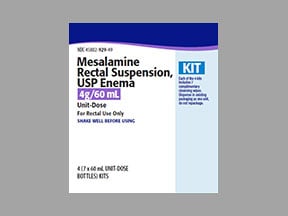
Rowasa Coupons & Savings Card – Discount Prices from $171.14
Brand for: Mesalamine-cleanser
My prescription
Edit
4GM, Mesalamine-cleanser (4 Kits)
Select pharmacy

CVS
$233.66
COUPON PRICE
Walgreens
$171.14
COUPON PRICE
Albertsons
$180.55
COUPON PRICE
Walmart
$478.03
COUPON PRICERowasa savings card
Show this card to your pharmacist
Walgreens
$171.14
BIN
ID
PCN
GRP
015995
LHKPX271008
GDC
DR33
Powered by
Related aminosalicylates prescriptions
More prescriptions for ulcerative colitis
Related aminosalicylates prescriptions
More prescriptions for ulcerative colitis
Rowasa (Mesalamine-cleanser) dosage forms
Dosage Quantity Price from Per unit 4GM 4 Kits $251.54 $62.88 4GM 1 Kit $76.61 $76.61
| Dosage | Quantity | Price from | Per unit |
|---|---|---|---|
| 4GM | 4 Kits | $251.54 | $62.88 |
| 4GM | 1 Kit | $76.61 | $76.61 |
What is the drug ROWASA used for?
ROWASA is used to treat ulcerative colitis, specifically to manage inflammation in the rectum and lower part of the colon. It contains mesalamine, which helps reduce symptoms such as rectal bleeding, diarrhea, and abdominal pain.
Is ROWASA the same as mesalamine?
Yes, Rowasa is a brand name for a medication that contains mesalamine. Mesalamine is used to treat inflammatory bowel diseases such as ulcerative colitis.
How effective is ROWASA?
ROWASA (mesalamine) is generally considered effective for treating mild to moderate ulcerative colitis, particularly in the distal colon and rectum. It works by reducing inflammation in the colon lining. Clinical studies have shown that many patients experience symptom relief and mucosal healing with its use. However, individual responses can vary, and it is important for patients to follow their healthcare provider's guidance for optimal results.
What is another name for mesalamine?
Another name for mesalamine is 5-aminosalicylic acid, often abbreviated as 5-ASA.
How much does Rowasa cost?
The cost of Rowasa can vary depending on factors such as the pharmacy, location, and whether the patient has insurance coverage. Without insurance, the price for a month's supply can range from approximately $200 to $500. Patients are advised to check with their local pharmacy for the most accurate pricing and to inquire about any available discounts or generic options.
